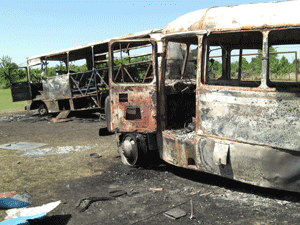
|
Questions Raised by the Khurcha Incident
 Observers: Ivar Dale, Aage Borchgrevink, Norwegian Helsinki Committee/Human Rights Centre of Georgia Observers: Ivar Dale, Aage Borchgrevink, Norwegian Helsinki Committee/Human Rights Centre of Georgia
On election day, 21st May 2008, Russian peacekeepers in the village of Khurcha, inside the de-militarized zone on the Georgian-Abkhaz conflict line, reported of shootings at around 14:00. Georgian TV reported that buses carrying voters travelling from the Abkhaz side of the Inguri river to Khurcha had been hit by grenades and gunfire, and Georgian television showed dramatic images of exchange of fire, burning buses and people running in panic. Later the same day, President Mikheil Saakashvili traveled to Zugdidi and met with one of the wounded at the local hospital. The incident was widely televised in Georgia and abroad. The Georgian Ministry of Foreign Affairs issued a statement blaming the Abkhaz side, with Russian support, for the incident.
The team reached Khurcha at 11:00 the following day, 22nd May 2008. Speaking to locals, officials and international military personnel, the observers learned the following:
The buses did travel from the Abkhaz side of the Inguri to Khurcha, carrying voters. The buses did not, however, go directly to the polling station in the village, but instead drove the voters to a soccer field nearby, situated close to the border between Georgian and Abkhaz controlled territory. A large group of journalists and TV-reporters had been brought there, to interview and film the voters from the Abkhaz side. Eye-witnesses report that shooting broke out and that people threw themselves to the ground. There were then three or four grenades fired at the buses, hitting both buses direct. Following this, heavy gunfire broke out, as Georgian soldiers and security services personnel started firing towards the Abkhaz side of the border.
The observers examined the site assisted by UNOMIG Military Expert Anders Tegnborg, who noted that the smaller of the two buses had been hit with what is likely to be an Under-slung grenade launcher. This weapon has a very short range, and requires special training to use with precision. The larger of the two buses was probably also hit with an RPG, as it was damaged more extensively. One of the grenades missed and hit the ground some thirty meters from the buses, indicating the direction from which the grenades were fired. The grenades were in all likelihood fired from the far side of the soccer field, in a direct arch towards the buses, at a distance of about 100 meters. At the spot where the grenades were fired from, large amounts of cartridges of three different kinds were found. The cartridges are from AKM, AK74 and PKM (more unlikely, SVD) of Soviet make, calibers used by both the Abkhaz and the Georgian side.
The governor of Khurcha declined to comment on the incident, but said that he did not organize the transportation of the voters. It is unclear who organized the bussing of the voters, but according to the governor, local officials and the local DECs were not involved.
Questions raised by the incident:
Local eye-witnesses explained that security forces in civilian clothing were either already present when the shooting started, or present shortly after, and returned fire. They were joined very quickly by Georgian Interior Ministry personnel. Khurcha lies inside the de-militarized zone, which means that Georgian military is not present there. The closest Georgian military post lies some 15 minutes driving on very bad roads away from the where the incident took place, not allowing for the time it would take to react to the sound of gunfire.
The rare and dramatic event occurred at the very moment when numerous TV-reporters had been brought to the village for a pre-arranged media show, effectively taking media interest away from numerous reports of electoral irregularities and violent incidents coming in from all parts of the country.
Local eye-witnesses all stated that they believe this incident was staged by the Georgian (that is, their own) side, noting in particular the fact that the passengers were brought not to the voting station in the center of town, but to the soccer field, that so many journalists had been brought there in advance, that it was unclear who organized the busing, and the rapidness with which Georgian military arrived at the scene.
That the grenades were fired from within the Georgian side of the conflict zone, at a very short distance.
That the incident took place during a staged media-show, playing into the recent focus of the Georgian government on the Abkhaz c nflict, and that it involved further screen time for president Saakashvili on Election Day.
The fact that the buses were not organized by local officials tasked with arraying the electoral procedures.
Georgian authorities should launch a serious, independent investigation of the incident to find out the circumstances of the attack and to identity persons responsible for what is a criminal act. If indeed staged by Georgian authorities themselves, the incident is a disturbing example of cynicism, playing on the tragedy that befell the victims of the Abkhaz conflict, risking the lives and health of innocent civilians for political gain.
4 Hfi. '08 ...im0f[m7f
|